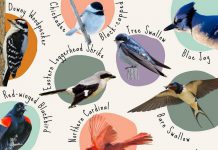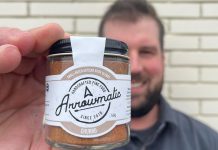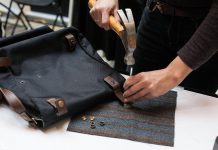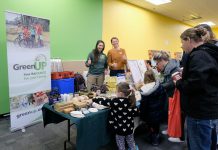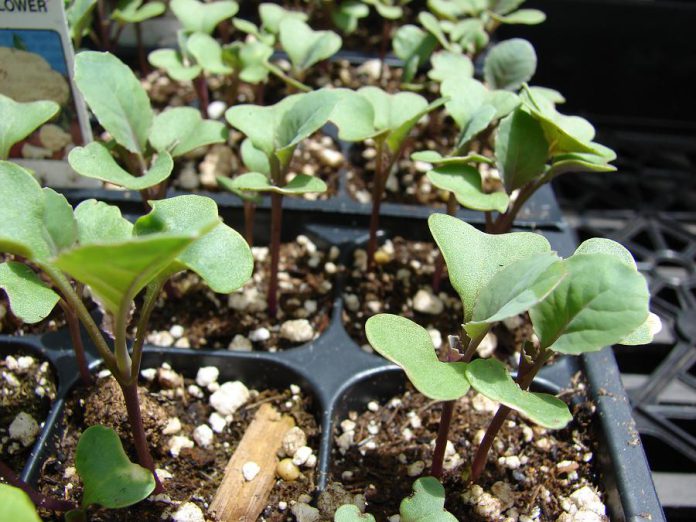
As the bitterly cold month of February continues, gardeners everywhere are counting down the days to spring. Although there’s no sign of the snow and cold going anywhere, it’s time to start thinking about what types of seeds you’re going to start indoors.
While it’s still a bit too early to start most types of seeds, it’s a good opportunity to get prepared. A general rule of thumb is to start seeds indoors two to six weeks before the last frost date. This average date of the last frost in the Peterborough region is May 18th.
Seeds that need a longer time to mature indoors (closer to the six-week period) include hot peppers, brassicas, and onions. Close behind are tomatoes, basil, eggplant, and okra. These need a slightly shorter window of time, around four weeks. Cucumbers, squash, and most melons should be planted indoors two weeks before the last frost date.
Now that you know when to begin planting indoors, the next step is to acquire seed. Seed catalogues have been showing up in mailboxes across the region over the last few weeks, allowing access to a wide variety of vegetable and flower seeds. Ordering from these companies — especially the ones that have been in business for generations — is generally a safe practice and will yield good results.
A word of caution: seeds traditionally found in big box stores are sometimes not as fresh as those purchased directly from a seed company. To ensure good quality fresh seeds, obtaining seeds at a seed exchange is a better idea.
At a seed exchange, you can meet other gardeners and find quality locally adapted seeds, which are some of the best available. You can either bring seeds to trade with others, or buy them directly from the vendors in attendance. Seedy Sunday, Peterborough’s seed sale and exchange, is being held on Sunday, March 1st at George Street United Church from 1 to 5 p.m. The event is free to attend.
Once you have your seeds, and the time is right, you need to think about planting.
Choosing the right soil is very important to growing successful seedlings indoors. Your best bet is to use “soilless medium”, commonly called “pro-mix”, to start your seeds. This soil is light and has minerals mixed in that all your seedlings need to get off to good start. Moisten the soil evenly before adding to containers.
Once seedlings are transplanted outdoors, you can add compost to give them an extra boost.
When it comes to containers for planting, your options are limitless. Get creative and use household items like egg cartons, paper towel rolls, or milk cartons. As long as it allows for sufficient drainage, pretty much anything goes. There’s also a wide variety of commercially available containers as well, many of which you can plant directly into the ground.
Fill your containers with the moist soilless medium and place one or two seeds in each one. Create a small divot in the soil to contain your seeds. Cover lightly and label the containers so they won’t get mixed up.
Once your seedlings have emerged from the soil, having good airflow around them is important. Putting a fan near them will prevent dampening-off disease or mould from forming. Another advantage to doing this is it allows them to become stronger and more resistant to wind once they’re transplanted outside.
Some seedlings (think tomatoes) may outgrow their pots and will need to be moved to a more spacious temporary home. As before, you can be creative with your pots as long as there is enough drainage. Combine peat moss, vermiculite, compost, and potting soil to provide ample nutrients for your growing seedlings.
Before your plants go in the ground, it’s important to harden them off. Hardening off allows them to become adjusted to the harsh outdoor elements and ensures a better rate of survival. Over the course of a week or two, place them outside in filtered sunlight on warm spring days, gradually increasing the amount of time they spend outside in the sun and in cooler temperatures.
After the threat of frost has passed, transplanting outdoors is the next and final step. Choose a location that’s well suited to each type of plant you’re growing. Planting instructions, including light and spacing requirements, are typically found on the back of most seed packets.
For additional resources and information, or more information about Seedy Sunday, check out the Peterborough Community Garden Network’s website at www.growpeterborough.org or call Jill Bishop at 745-3238 x204. Jill can also be reached by email at urbantomato@gmail.com.
Peterborough Seedy Sunday
A short film produced by Brian Mitolo showcasing some “seedy” work being done in the Peterborough community, including Peterborough Seedy Sunday and the work of the emerging Peterborough Seed Savers Network.





